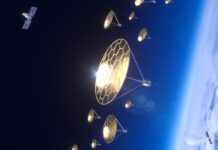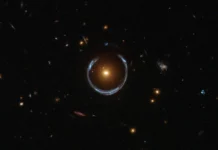In a statement issued in October 2024, the American Astronomical Society said that humanity’s scientific understanding of the universe is threatened by space activities, including the proliferation of satellite constellations, space debris, and radio and electromagnetic interference. It is worth paying attention to the potential of space advertising: giant billboards hanging in low Earth orbit.
“It is the position of the American Astronomical Society that intrusive space advertising should be prohibited by an appropriate international convention, treaty, or law,” the statement said.
Congress has already banned domestic launches of any “payload containing any material that could be used for the purposes of obtrusive space advertising,” which defines obtrusive space advertising as “advertising in outer space that is capable of being recognized by a person on the Earth’s surface without the aid of a telescope or other technological device.”
“The U.S. federal ban on obtrusive space advertising is a critical bulwark against the insidious pollution of the natural sky by private interests,” said James Lowenthal, an astronomer at Smith College and a member of the American Astronomical Association’s (AAS) Committee for the Protection of Astronomy and the Space Environment (COMPASSE), in an email to Gizmodo. “This ban recognizes that the sky belongs to everyone and must be protected for all people now and in the future.”
“But the ban only applies to U.S. launches; other countries could approve the launch of ‘space billboards’ from their soil that would be visible from around the world,” added Lowenthal. “That’s why an international ban is critical.”
Two Russian companies, Avant Space and StartRocket, have expressed interest in launching advertising into space. According to SpaceNews, the Russian subsidiary of PepsiCo and StartRocket have signed a contract to advertise an energy drink from space, although after research tests, both companies did not pursue the idea.
Images on StartRocket’s social media illustrating the proposed space advertising technology were heavily criticized.
Advertising in low Earth orbit will function similarly to large-scale drone shows, which are increasingly replacing fireworks, which are noisier and can cause fires on the ground.
According to NBC News, StartRocket’s space advertising will consist of an array of satellites with 30-foot (9.4-meter) reflective sails; each sail, reflecting sunlight toward the Earth, will be placed within the larger array to form words, patterns, or logos for paying customers.
The call for a ban comes at a time when privatized spaceflight is booming. Private companies are sending missions to the International Space Station, and space agencies are increasingly relying on companies like SpaceX for their launch vehicles. In October 2024 – in fact, a few days after the AAS announcement – the largest satellite constellations to date were deployed in Earth orbit.
“If there used to be very few big players in space, and they were all at the level of national governments – primarily the US/NASA, ESA, China, Russia, and India – now there are hundreds and thousands of private space companies competing for a piece of the space pie,” said Lowenthal. “It is different and more difficult to control and communicate with them than with national governments. They have different interests, different cultures, different goals, different ways of doing things than governments. And they can have very strong interests in advertising, including in space.”
These satellite constellations are not used for advertising, but they also clutter up low Earth orbit. Ground-based and space-based telescopes deal with streaks in images caused by satellites passing through their fields of view, although scientists are developing software workarounds to address this problem.
Light pollution is increasing worldwide, according to NOIRLab’s Globe at Night project. Messages aside, space advertising will make it even more difficult for the public and scientists to view the sky and take up more space in an already crowded low Earth orbit.
“For people in general, the loss of a naturally dark, pristine sky to space billboards would be profound and devastating,” said Lowenthal. “The night sky is a source of solace, mystery, awe and inspiration for countless millions of people. It connects us to our ancestors, history and culture.”
It is not known whether other countries will sign on to the global ban, but the AAS has called on the US delegation to the UN Committee on the Peaceful Uses of Outer Space to help keep the sky free of space advertising.









